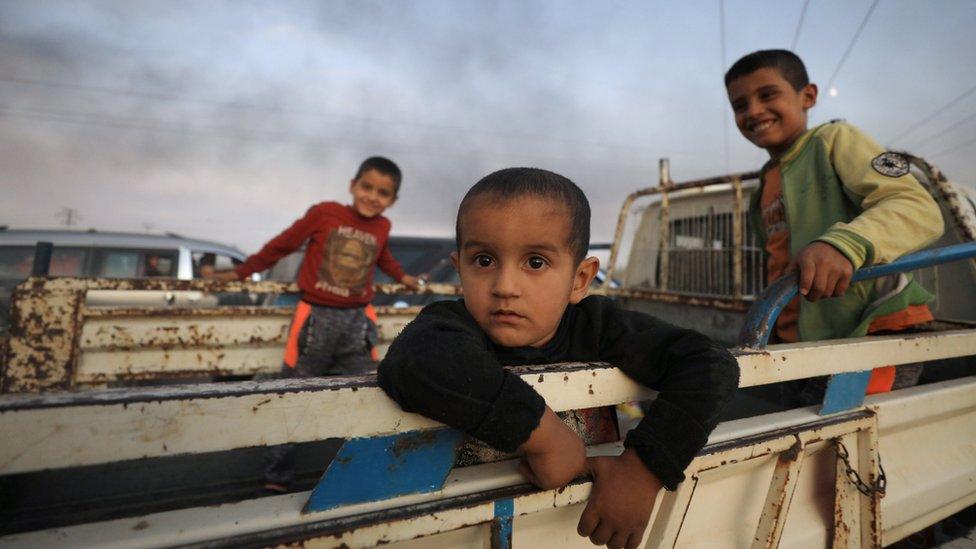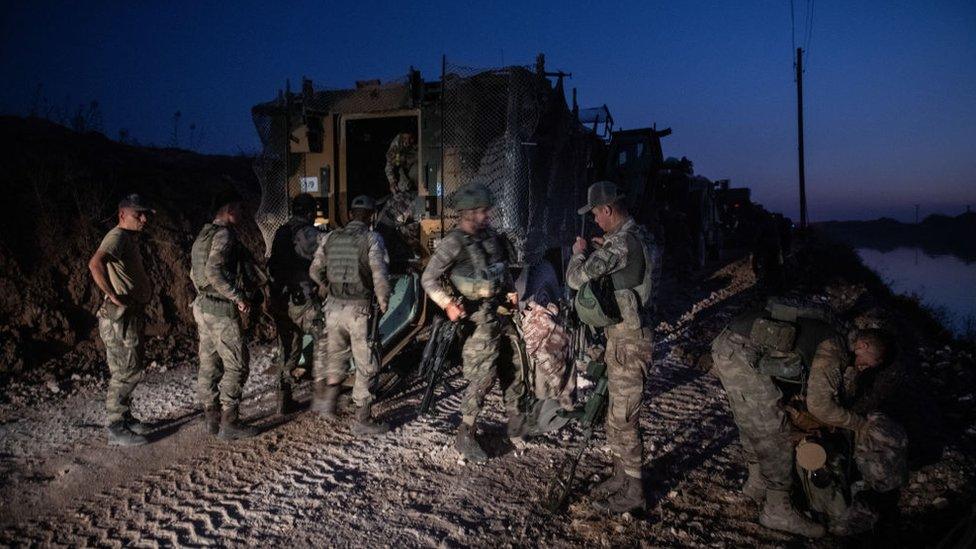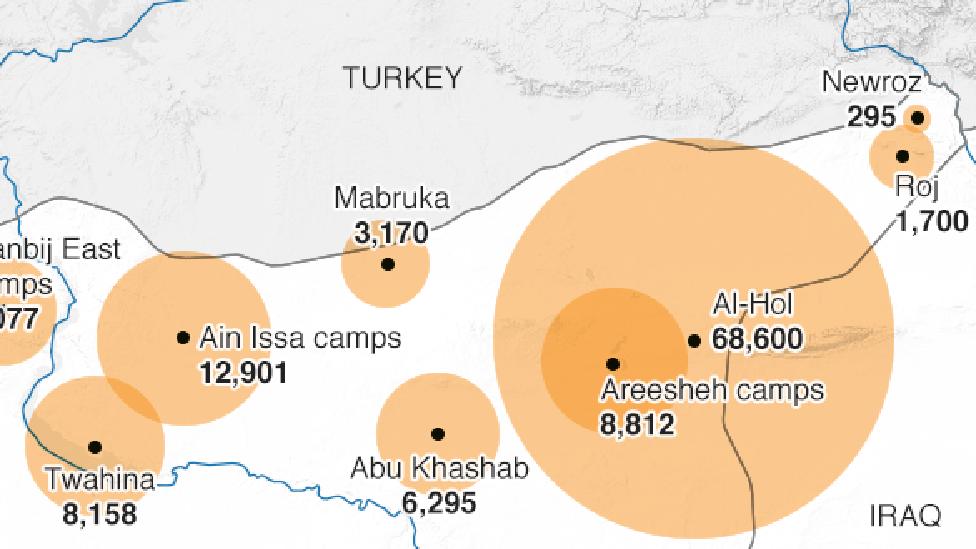Turkey launches ground offensive in northern Syria
- Published
Some residents began to flee as smoke rose over the border town of Ras al-Ain
Turkey has launched a ground offensive in northern Syria, hours after its warplanes and artillery began hitting territory held by Kurdish-led forces.
President Recep Tayyip Erdogan said the operation was to create a "safe zone" cleared of Kurdish militias which will also house Syrian refugees.
The unilateral decision has been widely condemned, with the European Union urging Turkey to end its offensive.
Kurdish-led forces who were key US allies vowed to resist.
The offensive was launched just days after President Donald Trump withdrew US troops from the border area, a decision that was criticised at home and abroad.
The Kurds - who helped defeat the Islamic State (IS) group in Syria - guard thousands of IS fighters and their relatives in prisons and camps in areas under their control. It is unclear whether they will continue to do so if battles break out.
In an earlier statement, Mr Trump - who had threatened to "obliterate" Turkey's economy if it went "off limits" - said the US did not "endorse this attack", calling the operation a "bad idea".
UK Foreign Secretary Dominic Raab expressed "serious concerns" about the offensive, saying it "risks destabilising the region, exacerbating humanitarian suffering, and undermining the progress made against" IS.
What is Turkey's plan?
On Twitter, Mr Erdogan said the mission "was to prevent the creation of a terror corridor across our southern border, and to bring peace to the area", vowing to "preserve Syria's territorial integrity and liberate local communities from terrorists."
Turkey considers the Kurdish YPG militia - the dominant force in the Syrian Democratic Forces (SDF) - an extension of the banned Kurdistan Workers' Party, which has fought for Kurdish autonomy in Turkey for three decades.
Several towns and villages were hit by air strikes and artillery fire, and residents were fleeing the towns of Ras al-Ain and Tal Abyad. The UK-based Syrian Observatory for Human Rights, a monitoring group, said at least eight people had been killed.
Late on Wednesday, Turkey's defence ministry said Turkish troops and Syrian rebel allies had entered the area "east of the Euphrates". A pro-Turkish group told AFP news agency the offensive had begun in Tal Abyad, an area under YPG control.
But SDF spokesman Mustafa Bali said their forces had repelled a ground incursion, and that there was "no advance as of now".


The Turkish government plans to send two million of the 3.6 million Syrian refugees living on its soil to the "safe zone". The offensive could displace 300,000 people living the area, the International Rescue Committee said.
It was thought the offensive - Turkey's third military operation in northern Syria in three years - would initially focus on a 100km (62-mile) stretch between Tal Abyad and Ras al-Ain, a sparsely populated, mainly Arab area.
Mr Bali said the towns of Kobane, to the west, and Qamishli, to the east, had been hit by Turkish shelling. If Turkish troops advance towards those towns they would have to move into densely populated, mainly Kurdish areas.
The SDF also said one the prisons holding IS fighters had been hit by a Turkish airstrike. And amid growing humanitarian concerns, it asked the US-led coalition against IS to establish a no-fly zone to stop "attacks on innocent people".

A swift move
By BBC's Orla Guerin in Akcakale on the Turkish-Syrian border
Turkey has moved incredibly swiftly. It is hard to give any assessment at this point of how long this operation will carry on. It has certainly been very long in the planning - it is something that Turkey has wanted to do for at least two years.
President Erdogan says this is the beginning of Operation Peace Spring. There is no doubt that for the Syrian civilians who are just across the border this is going to be seen as another round of battling in an agonisingly long war.
The Kurdish forces have emphasised almost frantically that the hard-won gains in their long battle against IS are now being put at risk. The SDF have lost an estimated 11,000 fighters in battling IS. They succeeded with American help.
But they point out, for example, that they may have to withdraw their forces from prisons where they are holding IS fighters or from cities that have been liberated from IS. The Kurds are basically saying to the West: the war that we fought on your behalf is at risk because of what Turkey wants to do.

What has the international reaction been?
The EU said it was "unlikely that a so-called 'safe zone'... would satisfy international criteria for refugee return while the UK and France planned to request an emergency meeting of the UN Security Council to discuss the situation.
Nato Secretary General Jens Stoltenberg said Turkey, a Nato member, had "legitimate security concerns" but that he expected the country to "act with restraint and to ensure that any action... is proportionate and measured.

Residents fled border towns after the offensive started

First group of Turkish infantry preparing to enter Syria
US Senator Lindsay Graham, a close ally of Mr Trump, said he would lead an effort in Congress to "make Erdogan pay a heavy price", adding: "Pray for our Kurdish allies who have been shamelessly abandoned by the Trump Administration."
In his statement, Mr Trump also said Turkey would be responsible for ensuring that suspected IS fighters being held captive remained in prison and that IS did not regroup.
How would an incursion affect the IS situation?
The SDF says it is detaining more than 12,000 suspected IS members in seven prisons, and at least 4,000 of them are foreign nationals. The exact locations have not been revealed, but some are reportedly close to the Turkish border.
Inside the camp of IS families in Syria
Two camps - Roj and Ain Issa - holding families of suspected IS members are inside the "safe zone".

Are you in the affected area? If it is safe to do so contact us by emailing haveyoursay@bbc.co.uk, external.
Please include a contact number if you are willing to speak to a BBC journalist. You can also contact us in the following ways:
WhatsApp: +44 7756 165803, external
Tweet: @BBC_HaveYourSay, external
Send pictures/video to yourpics@bbc.co.uk, external
Text an SMS or MMS to 61124 or +44 7624 800 100
Please read our terms of use and privacy policy
- Published14 October 2019
